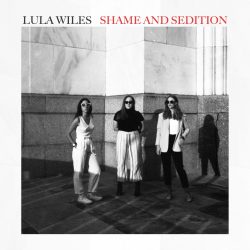An evolved sound poses hard questions.
 Mention Lula Wiles and the response is likely to be tight harmonies, acoustic, folk and lyrics that tackle difficult subjects head-on. To that on their third album ‘Shame and Sedition’ they have added powerful layers of indie rock. Possibly an unusual direction for the folk-based trio, it works very well. Like thunder clouds before a storm these new layers of instrumentation auger the darkness and turmoil of lyrics that hit harder than anything the trio has done before.
Mention Lula Wiles and the response is likely to be tight harmonies, acoustic, folk and lyrics that tackle difficult subjects head-on. To that on their third album ‘Shame and Sedition’ they have added powerful layers of indie rock. Possibly an unusual direction for the folk-based trio, it works very well. Like thunder clouds before a storm these new layers of instrumentation auger the darkness and turmoil of lyrics that hit harder than anything the trio has done before.
Lula Wiles have been described as folk music for the 21st century but they are also deeply embedded in the traditions of their music. Isa Burke, Eleanor Buckland and Mali Obomsawin “started out singing folk songs and playing fiddle tunes” long before they formed a band that takes its name from an old Carter Family song. These are the inheritors of protest music as they call out the many deep injustices they see in today’s world, most having a depressingly similar ring to those that have featured on their Smithsonian Folkways label for decades.
Despite the isolation of the old farmhouse where they were living and recording, the themes that run through ‘Shame and Sedition’ struck all three with a greater urgency, as if these thoughts that had run throughout their lives had finally caught up with them. Perhaps that explains the album’s exceptional fervour.
‘In Dreams’ opens the record with the gentle harmonies where Lula Wiles left off their previous album. These inhale and exhale with gathering depth to Obomsawin’s words inspired by the works of James Baldwin about all those fighting against colonial oppression. Together they convey a vastness both sonically and lyrically.
Burke shames and sneers not just at those generally who profit from their fellow humans in ‘Oh My God’ but takes specific aim at one in particular (think online shopping). An electric guitar fizzes as the fury ratchets up, “Oh my god, how embarrassing for you!/ Oh my god, you really think you built that throne you look down from/ To spit on everyone”.
The peak of this new harder edge blending with the Lula Wiles three-part harmonies comes in ‘Television’, a blasting invective against the damages of rampant consumerism. Again, there is a slow, almost menacing build-up into a crescendo of beautiful sound that reverberates skywards. The harmonies at different heights only add further heft to the lyrics.
‘Do You Really Want The World to End?’ asks what sort of future do the younger generations face? “I would take you there, I would make you care/ About people like me and my friends/ Do you really want the world to end?” The swirl of harmonies and the urgency of co-writer Sean Trischka’s percussion drive home the fact that this is something we all have to face, and now.
After the intractability of such massive issues Lula Wiles offer some sense of release at a more personal level. ‘Mary Anne’ melds a country fiddle with the crash of electric and drums. ‘Cold Water’ echoes with letting go in a similarly Americana vibe.
‘Shame and Sedition’ is a reaction to the pandemic. To Lula Wiles it has revealed their country as a giant corporation gouging the majority for the enrichment of a very small minority. Indie-rock fuels their lucid, but troubling message to make them standard-bearers of contemporary protest.


